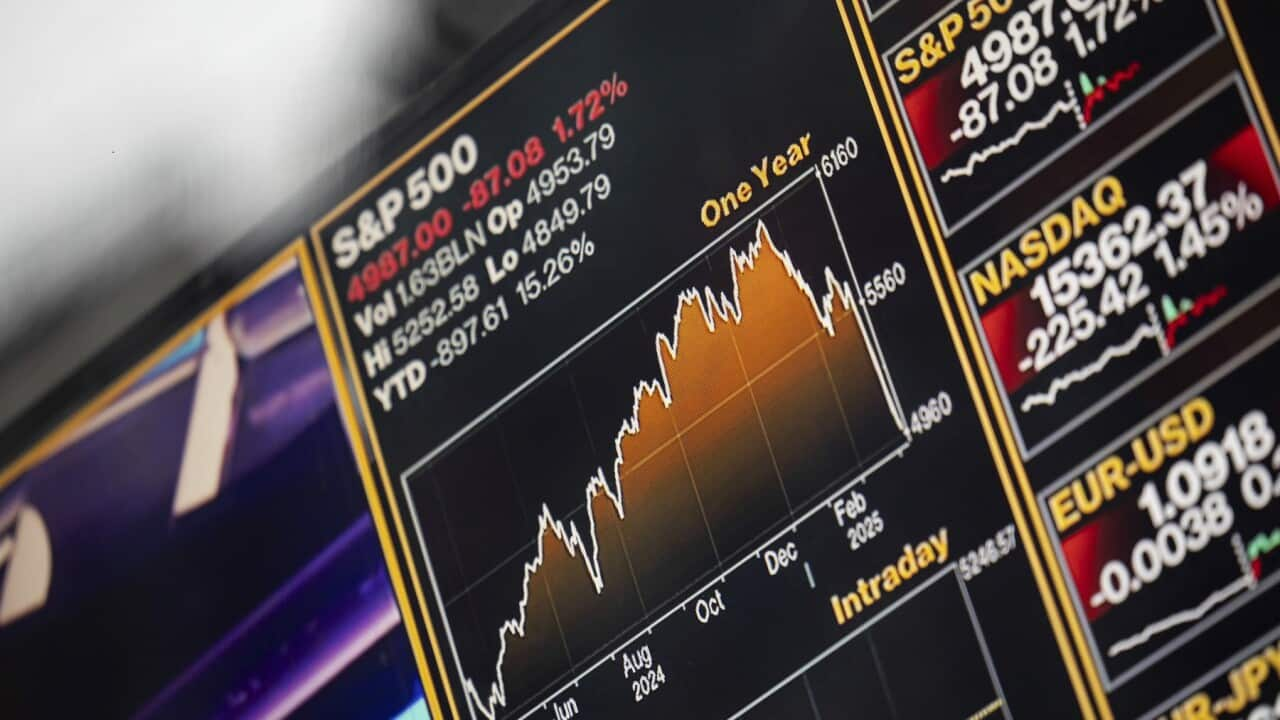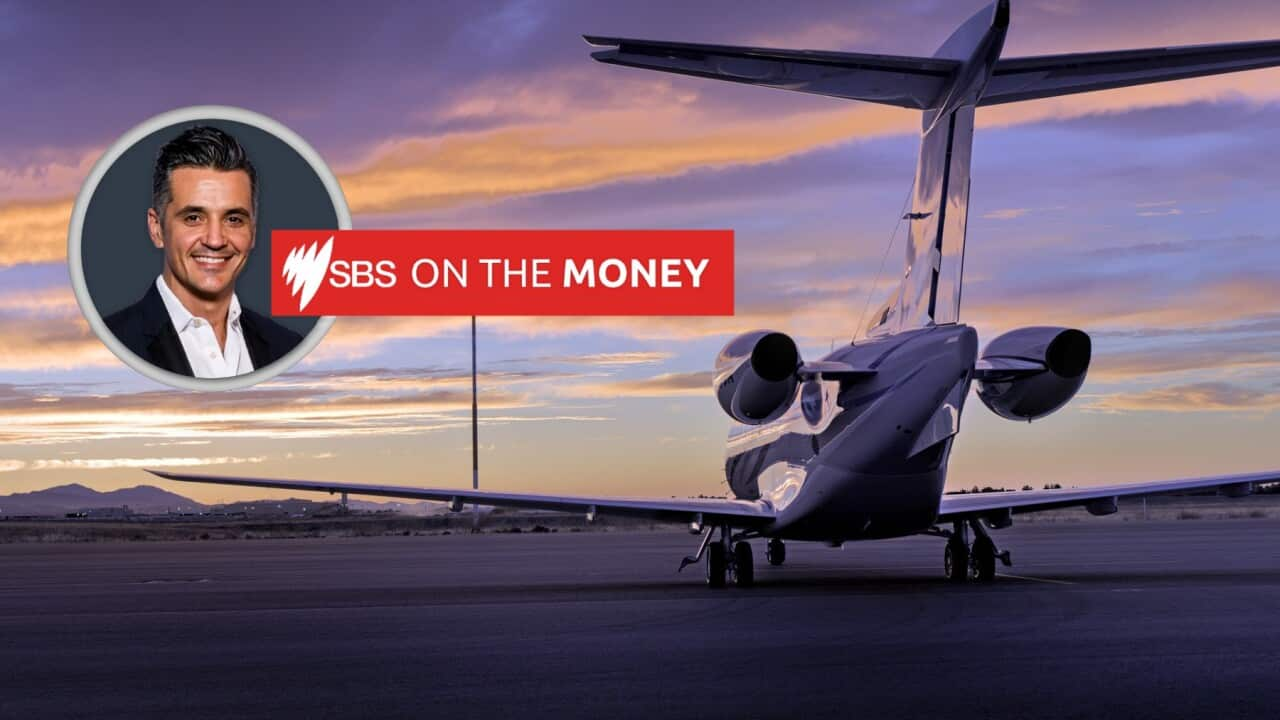TRANSCRIPT
SBS WORLD NEWS: "Good evening, markets around the world have reopened in a panic today."
ABC AMERICA: "Good morning on this Monday morning, we're coming on the air for opening bell on Wall Street and what is expected to be another brutal day of trading."]]
BBC: "The move has caused turmoil on global markets and spark concerns it could lead to a recession."
Amid fears of a looming recession, US President Donald Trump is doubling down on efforts to reshape the global economy.
Despite mounting pressure on financial markets in the wake of his tariff announcement, Donald Trump is now threatening China with an additional 50 per cent tariff.
The threats, made in response to China's announcement of retaliatory tariffs, are raising fresh concerns over what could become an all-out trade war.
But the President was resolute, adding that he would also be cancelling any requested meetings with China.
“With China, as you know, against my statement, they put a 34% tariff on above what their ridiculous tariffs were already. And I said, if that tariff isn't removed by tomorrow at 12:00, we're putting a 50% tariff on above the tariffs that we put on.”
Despite his top advisers signalling a potential for negotiations, Donald Trump has ruled out discussions with Beijing.
If the Trump administration does impose the additional tariffs, US tariffs on Chinese goods would reach a combined 104 per cent.
Economists warn the move could not only increase costs for American consumers, but also incentivise China to flood other markets with cheaper goods.
Carl Chan is the President of the Oakland Chinatown Chamber of Commerce in California.
He says small businesses are going to suffer as a result.
"Many small businesses, they are suffering the most. And since, you know, the cost of doing business is much much higher. So even though people may be paying more, however, these businesses, they are not making more money at all."
With global financial markets falling steadily since the announcement last week [[02/04]], market volatility shows investors are still hoping for tariff negotiations.
But the President says he will only be open to negotiations if he feels the deal is fair and beneficial to the United States.
Assuring the public that the initial financial pains will pay off in the long term, Mr Trump anticipates the tariffs will lead to more manufacturing jobs in the U-S.
Bankrate Chief Financial Analyst Greg McBride says sooner or later, prices are going to increase.
"The widespread expectation is that we are going to see higher prices and in some cases you're probably starting to see that already for things like perishable goods where that inventory comes in much quicker than, say, bigger ticket items, where car dealers, for example, a lot of them stocked up on imports and months passed. So they've got a good supply on the lot now. The cars that will be subject to tariffs haven't yet entered the country, but at the end of the day, there's really not going to be a whole lot of places to hide because so many things that we buy are either imported or have components that are imported, and tariffs impact the pricing of all of that."
Mr Trump's threats to China came during a White House meeting with Israeli Prime Minister Benjamin Netanyahu.
The United States has imposed a 17 per cent tariff on Israel.
In an attempt to secure concessions from Mr Trump, Mr Netanyahu says Israel will take its own tariffs against the U-S to zero.
“ I can tell you that I said to the president a very simple thing. We will eliminate the trade deficit with the United States. We intend to do it very quickly. We think it's the right thing to do. And we're going to also eliminate trade barriers, a variety of trade barriers that have been put up unnecessarily. And I think Israel can serve as a model for many countries who ought to do the same. I recognize the, the position of the United States. It says, you know, we allow other countries to put tariffs on us, but we don't put tariffs on them. And, you know, I'm a free trade champion, and free trade has to be fair trade.”
When asked if he would consider sparing Israel, Mr Trump told reporters that the U-S already gives Israel a lot of money.
"Maybe not, maybe not. Don't forget, we help Israel a lot. You know we give Israel $4 billion a year. That's a lot, congratulations by the way, that's pretty good. But we give Israel, billions of dollars a year, billions. It's one of the highest of ... and we give a lot of we have a lot of countries money. "
Showing few signs of backing down, White House trade advisor Pete Navarro says countries will need to do more than simply lower their own tariff rates to reach deals.
Mr Trump says a European Union proposal for bilateral tariff exemptions on cars and industrial products is not enough to make up for the transatlantic trade deficit.
European Union Trade Commissioner Maros Sefcovic says it may take time to reach an agreement.
"We have offered zero-for-zero tariffs for cars and all industrial goods. Second, let's be clear however, engaging the US will take both time and effort. Right now, we are in the early stages of discussions because the US views tariffs not as a tactical step, but as a corrective measure. We are fully prepared to sit at the negotiation table whenever our American partners are ready."
As the President and White House officials defend the sweeping tariffs, investors and economists say the risk of recession is growing.
George Cipolloni is a portfolio manager at Penn Mutual Asset Management.
He says Mr Trump's tariff policies could lead the global economy down a familiar and unfavourable path.
"Whenever we've had a crisis, be it COVID, be it the great financial crisis, be it 9/11, even, we've always had the government as the safety net for the markets. And that's gone today because the government is the cause of this crisis, which makes it so unique and so unusual. And so, we don't want to go back to 1930 corollaries, we don't want to go back to that path. I mean, that path was devastating. But there are a lot of commonalities."













